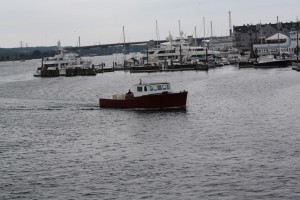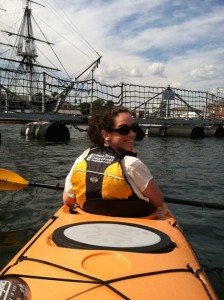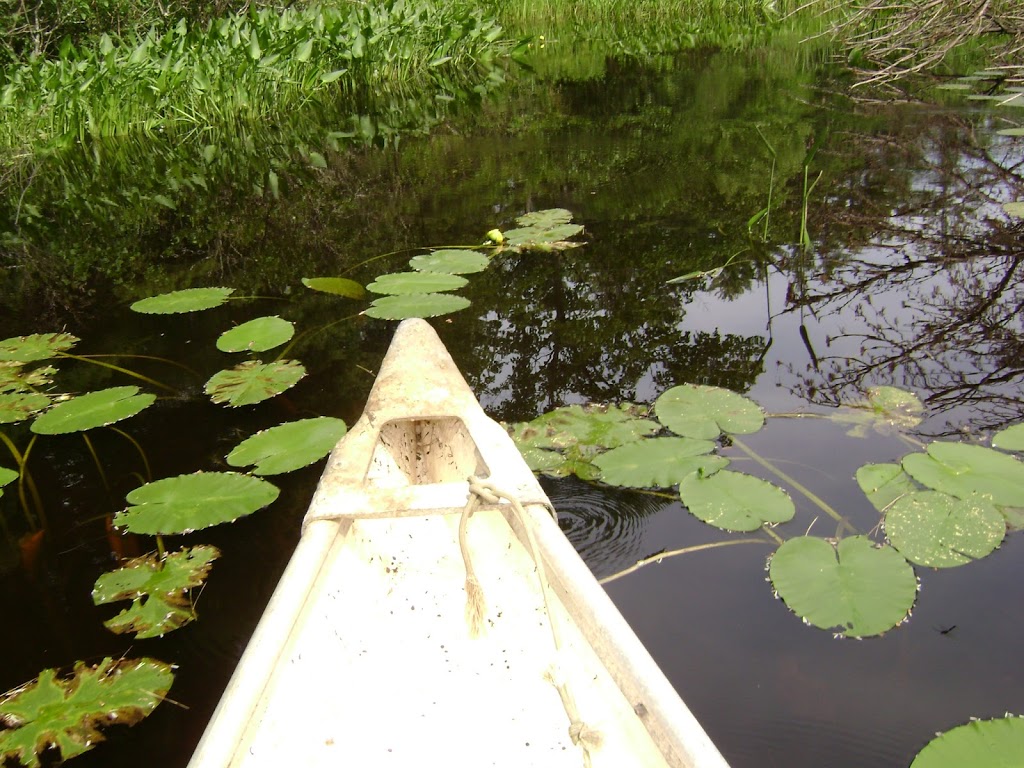“O God thy sea is so great and my boat is so small.”
I speak to you in the name of one God. + Amen.
President John F. Kennedy had a bronze plaque on his desk in the oval office with the Breton Fisherman’s prayer on it; the same prayer that I began this sermon with. The plaque was given to him by a navy admiral who used to give such plaques to new submarine captains. Kennedy recognized that this prayer stretched even further than the literal context, which we heard in today’s Gospel passage, into our everyday lives. That prayer is modified by many groups to include a call for protection from God. The girl scouts of Canada sing the prayer adding, “Oh Lord Protect me, your sea is so big and my boat is so small.” I would venture to guess that each of us has encountered a time in our lives when we feel like the disciples in that boat at sea in a storm.
I’ve never been out to sea on a small boat but I grew up canoeing so the way I relate most closely to the literal interpretation of this passage is through one of my experiences on a canoe trip. I drew the short straw on that trip and had to sit on the bottom of the canoe in the middle while my sister and brother got to sit on the seats and paddle. We were on a lazy river in Maine, on one of our many camping vacations. My parents were in a second canoe and it took work for them to stay near our boat since my sister lacked a little something in the steering department. In the center of a canoe are two-to-three wooden slats going horizontally from one side to the other. My father told me to sit between these slats either cross-legged or to sit sideways, stretching my legs over the side of the canoe and into the water. The one thing I was instructed not to do was to put my legs under the bars.
About an hour into the trip my brother started horsing around and rocking the boat. My sister and I were cross with him, but this just made him rock the boat more. (That is what little brothers are good for, after all.) And, you guessed it, he flipped our canoe over. My sister and brother easily swam to the surface and began bickering; but I had done the one thing my father warned me about and stretched my legs under the wooden bar. I was trapped, upside down under the canoe, under water. It was probably only a few seconds before my dad got to us and flipped the boat upright getting me above water again, but I was terrified. I still remember the feeling of being under the water and not knowing what to do or how to escape. I was afraid to get back in the boat and I can understand how some people can be afraid of water.
Water is powerful and being stuck out at sea with a storm rising must be one of the most terrifying things a person can face. If I had been in the boat with the disciples that day long ago, I would have woken Jesus up with even more colorful language than the disciples did. It is hard to trust that God will provide when we face the storms in our lives. Does trusting that God will provide mean that we believe everything will always work out the way we would like it to? Does trusting God mean that we don’t need to worry about anything and we can leave all of the details to God? No.
Trusting in God means that we will use the gifts we’ve been given and take the steps we are able to take in preparation for whatever life throws our way. What we are trusting in is that in the end, regardless of the result, everything will be okay. Our salvation is assuredthrough Christ who died to save us. — But trusting in that salvation to be “enough” is easier said than done. Trusting God in the midst of a storm means that we recognize how little control we actually have in life. We would like to believe that we can control so much, but when troubles arise we are forced to face the fact that we actually have little to no control over most things.
We can learn a little something about this by listening to the story of Job. The book of Job in the Old Testament teaches us about a man who has had everything in his life torn away. Job, a pious and faithful Jew has all of his animals and his 10 children killed by Satan –“The Adversary” – who is said to be testing Job’s piety. In the midst of it all Job still offers praise to God. As the story of Job continues, and as the storms in Job’s life increase, Job begins to face personal physical sickness and pain. Eventually, Job calls out in distress to God. He wants to understand why he has been cursed. He is a righteous man who doesn’t deserve the storms in his life.
 The Old Testament lesson we heard this morning is the beginning of God’s answer to Job: and it is fitting that God calls out from the whirlwind. God doesn’t offer Job a rote response. God draws Job’s attention to the many areas where Job is ignorant of the complexities of creation. He doesn’t get a neat and tidy solution to his storms; rather, like the disciples in our Gospel lesson, Job is met with God illuminating even more places where human intelligence simply cannot go. Sure, we would all like God to tie a neat bow on it and explain why it is that we face hardships in our lives, but God answers us by pointing out all of the other things we cannot understand. The key is learning to surrender our need for control in the little things so that we are more able to cope when the big things pop up. But that is easier said than done.
The Old Testament lesson we heard this morning is the beginning of God’s answer to Job: and it is fitting that God calls out from the whirlwind. God doesn’t offer Job a rote response. God draws Job’s attention to the many areas where Job is ignorant of the complexities of creation. He doesn’t get a neat and tidy solution to his storms; rather, like the disciples in our Gospel lesson, Job is met with God illuminating even more places where human intelligence simply cannot go. Sure, we would all like God to tie a neat bow on it and explain why it is that we face hardships in our lives, but God answers us by pointing out all of the other things we cannot understand. The key is learning to surrender our need for control in the little things so that we are more able to cope when the big things pop up. But that is easier said than done. When Jesus speaks to the storm saying, “Peace! Be Still!” the world is rocked. The winds die down and the waves shrink away. Jesus challenges the disciples, asking if they have any faith at all. It is easy for us, sitting on this side of the story, to criticize the disciples for their lack of faith, but we must remember, this is still early in the story of Jesus’ ministry. The disciples are still not certain of the true, divine identity of their teacher. And they are facing a situation that could most certainly mean death. But Jesus also has a point: how many wonders and miracles must He show them before they will believe? How many does he have to show us? We have the luxury of knowing the end of the story, of knowing the resurrected Christ, yet we still fear the storm.
This “calming of the sea” is regarded as one of Jesus’ miracles, but it is also an example of what we should be seeking everydayin our lives. As followers of Christ it is our responsibility to hear and speak the word of “Peace” in the storms we face each day rather than waiting for catastrophe to strike before calling out to God. It is so easy to get caught up in the hustle and bustle of life and forget to hear the word “Peace” in the midst of it all. How many times do we say, “I can’t do that I have too far too much on my plate already.” When that is our rote response in so many instances in life it is no wonder that our relationship with Christ becomes a Sunday morning liturgical occurrence rather than a living, vibrant exchange.
On that canoe trip in my childhood I had been given all of the advice and information I needed in order to make it through the day. But I didn’t heed the advice; I allowed comfort and convenience to cloud my judgment and enforce different priorities. If I’d been sitting in the canoe as I’d been taught it wouldn’t have prevented the boat from capsizing, but my recovery from that emergency would have been different.
God wants us to call out in times of joy as well as times of crisis. Our western faith often becomes a faith of convenience, until the storms come along. When sickness, death, loss of relationship, difficulty at work, or other challenges arise we are the disciples crying out saying, “Teacher, do you not care that we are perishing?” But where was our call to God when our six year old rode her bike without training wheels for the first time; when we ran a mile farther than we’d ever run before; when a friend called out of the blue right when we needed it most? Where was our cry to God when we had “just” another normal day?
 Job was in constant conversation with God throughout his entire life; maybe that’s why God’s call from the whirlwind was so loud… because Job was inclined to listen for God’s voice in his life. I wonder if the still, small voice of God that is in all of our lives would really seem so still and small if we were accustomed to listening for it on a daily basis. Maybe if we paid closer attention that still, small voice would actually roar like a tidal wave.
Job was in constant conversation with God throughout his entire life; maybe that’s why God’s call from the whirlwind was so loud… because Job was inclined to listen for God’s voice in his life. I wonder if the still, small voice of God that is in all of our lives would really seem so still and small if we were accustomed to listening for it on a daily basis. Maybe if we paid closer attention that still, small voice would actually roar like a tidal wave. Every day of our lives is a journey across the Sea of Galilee. And God, through the power of the Holy Spirit, is present in our boat on calm days and stormy ones. God is giving us all of the direction we need to make it through our journey, and God wants us to remain in constant conversation through the normal days and the extraordinary ones. We were created, just as we are, and sent us into this world — into this vast sea — for the benefit of all creation. Although our boat is indeed terribly, terribly small, we are never in it alone. So keep up the conversation: on smooth days and on rough days because it is easier to hear Christ’s call of “Peace” when we have made time for the stillness each day of our busy lives.
Amen.


Leave a Reply
You must be logged in to post a comment.